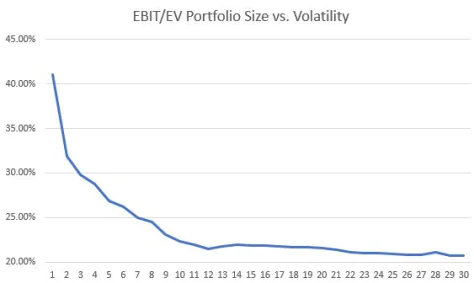Diversification Is Important in Value Investing Because...
Download our net checklist right now for free. Click Here.
Proper portfolio diversification is some of the most common advice investors hear. But what exactly is good portfolio diversification and why is it important to investing?
If we take a look at some value investing legends like Benjamin Graham and Warren Buffett, that doesn’t give a clear answer either. Benjamin Graham often kept hundreds of stocks in his portfolio, while, despite being Graham’s student, a young Buffett kept between four to six stocks during his prime in the 1950s, a period where he significantly outperformed.
This begs the question, what portfolio philosophy should an investor adopt?
What is Diversification in Investing?
What is diversification in investing? It is the method of buying a number of stocks in order to reduce non-market risk. What is non-market risk? The risk that the stock or industry you have invested in suffers a downturn specific to it.
An example of non-market risk is that you invest in an automaker company, and a huge frontpage news investigation reveals wide-spread safety malfunctions in their cars. This would likely crush the automaker’s stock. If you had diversified into a few automakers, or different industries all together, your portfolio would have been shielded from that drop.
Why is Diversification Important in Investing at All?
Why is diversification important in investing? Well, quite simply, diversification is important in investing because it’s a defence against ignorance. We have no idea what the future holds. If I did, I’d be writing this from my yacht right now! In the end, diversification helps us minimize the chance of a catastrophe in our portfolio.
How does diversification protect investors? Think of it this way: Generally, betting all of your money on a single number on a roulette wheel isn’t considered the best long term strategy. Why would you treat your portfolio any differently? Within your portfolio any one investment could end badly, we have no way of seeing a market crash coming.
Diversification means that even if a single investment in your portfolio tanks, you’re not out of the game. You haven't put all your money on a single number and have many more spins left in you, and your portfolio can continue to grow and compound.
Even Charlie Munger Diversifies His Investments
In his prime, a young Warren Buffett was famous for producing average returns of 50% per year. While he was managing a much smaller sum than he does now under Berkshire Hathaway, another key difference was in how many companies he invested in. Currently, Berkshire Hathaway owns or holds shares in dozens of companies. However, when Buffett ran his partnership he was comfortable concentrating his portfolio in five or six large positions, based on conviction. Besides these large positions he also held another 20 or so smaller statistically cheap companies.
Buffett stayed within his circle of competence and only bet on things he knew better than anyone else, and when he bet on something, he bet big. Buffett made sure to exploit the information asymmetry that existed in the days before technology, such as reading through dozens of long, boring filing that were a headache to get your hands on.
Charlie Munger, Buffett's right hand man, took Buffett’s famous quote that “diversification is protection against ignorance” to heart, and believed that just 4 stocks provided all the diversification you could need. In fact, there were periods where Munger held only three extremely concentrated positions. Note that expanding his portfolio from 1 stock to 4 stocks reduced his systemic risk significantly. Take a look:

The common thread here is that both Munger and Buffett believed that if you know what you are doing, then diversification is a hindrance rather than a help. As mentioned above, they still held a few positions in the off-chance that a single company would face an unforeseen issue. But they had high conviction in every single one of their portfolio stocks and researched everything there was to know about them before betting heavily.
The benefit here is related to your conviction. If you have done proper research and have the confidence in your pick, then you can hold a large concentrated position through the short term volatility. If you don’t have that level of confidence in your stocks, then you would need to rely on buying multiple positions, which can cap your gains.
Graham’s Diversification Strategy Was Based on Ignorance
In contrast, Ben Graham was happy to admit he was ignorant. The Graham philosophy was based on minimising as much downside risk as possible. The risk aversion is due to the era that Ben Graham grew up in: The Great Depression. This spectacular market meltdown colored all of Graham’s investment philosophy.
The great depression taught Graham two things: That the future was unknowable and that no matter how extreme markets get, they always will revert. Watching the absolute collapse of the stock market and the wider US economy, Graham sought as much extra protection in his portfolio as possible. Meanwhile, the mean reversion that occurred at the beginning and at the end of the great depression taught him that market extremes could be taken advantage of.
From all of this, Ben Graham created his net net investing strategy. While the returns could be phenomenal, Graham knew that overexposure could lead to colossal losses, and so built his portfolio around a basket of net nets. He believed that holding a basket of 30 net nets at any one time would allow a portfolio to approximate the long term historical returns associated with the strategy.
Graham didn’t care how well he knew a business and was unwilling to allow the market to permanently crush him as he saw happen to so many others during the great depression. To him, diversification as a hedge against ignorance was a good thing.
Do you have Warren Buffett Like Skill?
Despite Warren Buffett’s famous modesty, it is impossible to ignore just what an outlier he is. No one has managed to match his long term returns over the same period that he has been investing. In fact, most don’t match his returns for a fraction of the time Buffett has been in the markets.
Warren Buffett has extraordinary skill. He was running small side businesses in his pre-teens, and was already stock picking then. He was lucky enough to study under the grandfather of value investing. Last but not least, Buffett is just damn smart, with a great talent for management.
It is because of all of these abilities and skills, that Buffett could afford such a focused stock portfolio. The odds of continually investing in terrific companies whose competitive advantage will be unharmed decade after decade, are statistically near 0.
Every year thousands of investors and fund managers eat up every interview Buffett gives and every piece of information related to him, in the hope that they can pick up on what makes Buffett such a spectacular investor. Unfortunately, nearly all of them fail, and even worse, many underperform the benchmark indexes. Thinking you can model his contemporary strategy with success is what we’ve called the Warren Buffett Trap. In the long run, it would be much smarter to admit your own fallibility and aim for wider diversification. Sure, you won’t be Warren Buffett, but you will be making money.
One Other Key Reason Diversification is Important in Value Investing
There is another reason why diversification is particularly important to value investors. Value opportunities occur when the market is particularly pessimistic and many times that pessimism affects an entire industry. When this happens, investors see multiple value stocks in the same industry and buy them up without thinking about just how long the industry may take to revert to its mean.
In the meantime, an investor essentially has no diversification despite having multiple stocks in his portfolio as the entire industry is depressed. Due to this, being overweight the wrong sector at the wrong time, even at an attractive valuation, can lead to very poor long term returns.
Rather than guessing what is the right sector and what is the right time, investors will be better served buying a basket of value stocks in multiple industries.
Don’t worry about asset classes
Many reading this, and seeing the words “portfolio diversification” will no doubt jump to the idea of diversifying with asset classes. While this sounds logical, it only really makes sense for the short and medium terms - where other asset classes may enjoy a period of outperforming stocks. Over the long term however, the evidence is clear: stocks are the winning bet.
As mentioned above, other asset classes may outperform stocks but it is always over a temporary period, and generally followed by a long bear market. A few examples: In the 1970s commodities outperformed stocks, by the 80s however they would enter a multi decade bear market. REITs dominated the 2000s right until then didn’t in 2007. Finally, anyone who was fully in treasury bonds during the great financial crash would have felt pretty smart, however he would have felt pretty dumb if he had held on to them for the next decade. Again, over the long term, stocks are the winning bet.
There is one subsection of stocks that provides the creme de la creme of investment returns, and lucky for us it is almost exclusively for small investors: small value companies.

Finally, to bring this article full circle: within this small subsection, if an investor were to focus on extremely cheap stocks with incredible balance sheets, and buy a basket of them, they could expect a very attractive rate of return.
Don’t believe us? This is exactly what Benjamin Graham and Warren Buffett started with to make their fortunes. They were far ahead of the curve when it came to where the real returns were hiding and called these stocks net nets.
So what are you waiting for?
To get the free net net stock checklist, click here. Start putting together your high quality, high potential, net net stock investing strategy right now!
Article Author: Isaac Aydelman
Article image (Creative Commons) by Pedro Ribeiro Simões, edited by Net Net Hunter.






